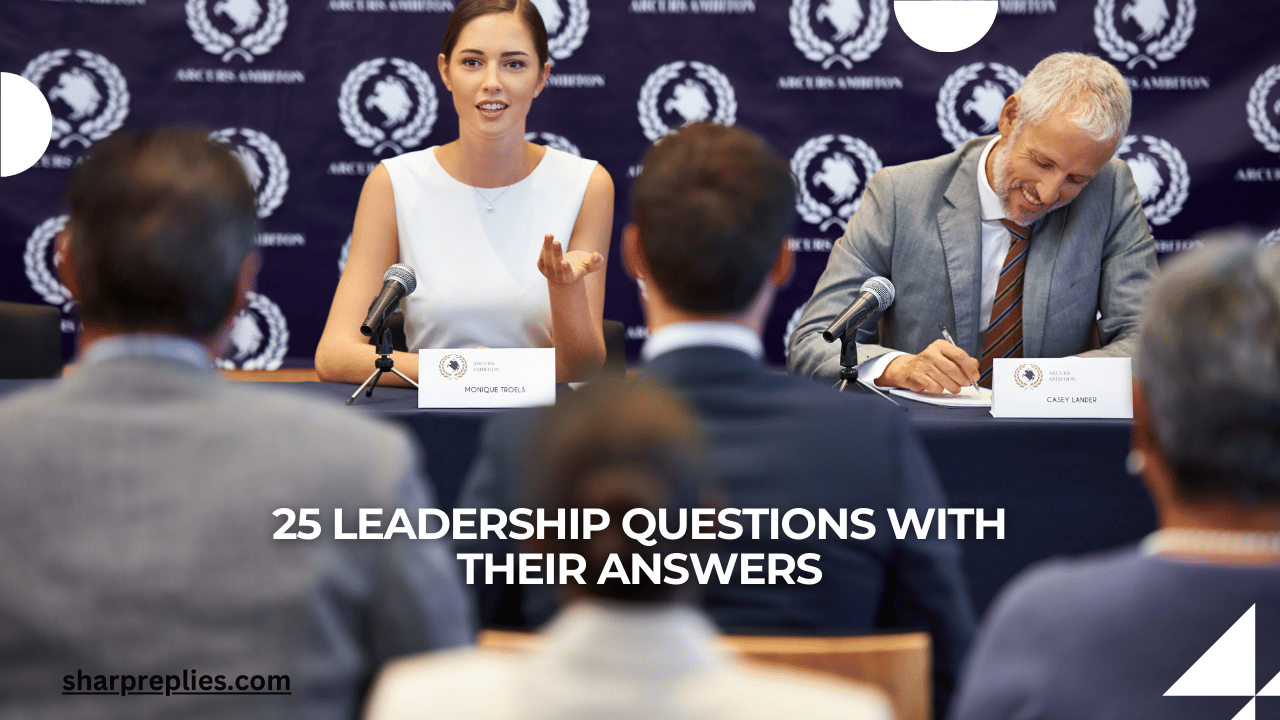In today’s dynamic world, leadership is not just a trait but a necessary skill that influences success in personal and professional spheres.
Leadership is more than just managing people; it involves vision, decision-making, and the ability to inspire others to reach collective goals. However, effective leadership is not always straightforward, and even the most experienced leaders are often faced with tough, thought-provoking questions that challenge their approach.
What makes someone a great leader? How do you balance authority with empathy? Can leadership qualities be learned or are they inherent?
In this article, we’ll explore 25 common leadership questions along with their insightful answers. These questions encompass a broad range of leadership scenarios, from team management to personal growth.
The aim is to equip aspiring leaders, as well as seasoned professionals, with a deeper understanding of the complexities of leadership. Whether you’re in a position of leadership or aspire to be, the insights shared here will guide you towards more informed and impactful leadership practices.
So, let’s dive into these questions and answers to help you enhance your leadership capabilities.
Contents
- 1 What are the essential qualities of a great leader?
- 2 How can I improve my decision-making as a leader?
- 3 How do I handle conflicts within my team?
- 4 How do I inspire my team to achieve common goals?
- 5 How can I build trust within my team?
- 6 Conclusion
- 7 FAQ’s
- 7.0.1 What makes a leader effective?
- 7.0.2 How can I be a more decisive leader?
- 7.0.3 Why is emotional intelligence important in leadership?
- 7.0.4 How can I improve my team’s performance?
- 7.0.5 What should I do if a team member is not performing well?
- 7.0.6 How can I manage conflict between team members?
What are the essential qualities of a great leader?
Great leaders exhibit a unique blend of emotional intelligence, vision, decisiveness, and integrity. A great leader is one who not only drives results but also motivates others and fosters a sense of trust within their team.
Communication skills are critical, as leaders need to clearly articulate their vision, expectations, and feedback. Another essential quality is empathy—the ability to understand and relate to the feelings of others. This leads to stronger relationships and better team cohesion.
Ultimately, a great leader inspires others to become the best version of themselves, both individually and collectively.
Leadership also involves adaptability. In a constantly changing environment, a leader who can pivot, innovate, and remain composed under pressure is highly valued.
Leaders who have a deep sense of self-awareness and are willing to reflect on their actions foster continuous growth, not just for themselves, but also for their teams.
How can I improve my decision-making as a leader?
Effective decision-making is one of the cornerstones of successful leadership. Leaders are often tasked with making tough choices that can impact individuals, teams, and organizations.
To improve your decision-making skills, it’s important to balance logic with intuition. While it’s tempting to rely on data and analytics, a leader must also trust their experience and gut feeling.
Developing a decision-making process that includes considering all relevant facts, seeking input from others, and reflecting on potential outcomes is essential.
Moreover, delegating decisions when appropriate can help distribute responsibility and ensure more diverse perspectives are considered.
Another crucial aspect is learning to make timely decisions. Indecisiveness can lead to missed opportunities and erode trust within a team. To be an effective leader, embrace the willingness to make decisions even when complete certainty isn’t possible.
How do I handle conflicts within my team?
Conflict is inevitable in any team environment, but it’s how a leader handles it that can make or break a team’s success. A skilled leader sees conflict as an opportunity for growth and improvement rather than a setback.
The key to managing conflict lies in active listening and maintaining empathy. When a disagreement arises, it’s important to hear out all perspectives and avoid jumping to conclusions.
Leaders must also remain neutral and avoid taking sides. By doing so, they foster a culture of respect and ensure that everyone’s opinion is valued.
In some cases, mediation skills are required, where the leader helps guide the conversation towards a solution-focused approach. Lastly, it’s important to address conflicts early before they escalate into bigger issues that can affect team morale and performance.
How do I inspire my team to achieve common goals?
Inspiration is one of the most powerful tools a leader can use to motivate their team. To inspire others, a leader must be passionate and committed to the team’s goals.
This passion is contagious and helps energize the team to work towards a common vision. An inspiring leader doesn’t just direct; they actively engage their team in the mission, ensuring everyone understands their role in the larger picture.
Moreover, setting clear expectations, celebrating small wins, and fostering a sense of ownership in the team’s success are powerful ways to inspire commitment and drive.
Encouraging continuous learning and providing opportunities for team members to grow and develop further also keeps the morale high and motivates the team to strive for excellence. By leading with authenticity, a leader can ensure their team remains focused and passionate about achieving collective success.
How can I build trust within my team?

Building trust is essential for fostering a high-performing team. As a leader, you must be consistent, transparent, and accountable.
A trusted leader follows through on promises and communicates openly about both successes and challenges. The key to building trust lies in vulnerability—being open about your own mistakes and growth encourages your team to do the same.
Leaders must also be approachable, creating an environment where team members feel comfortable sharing ideas and concerns.
Recognizing and appreciating the contributions of others is another critical way to build trust. Trust is a two-way street, so being respectful and considerate in every interaction will help solidify strong relationships within the team.
Conclusion
Leadership is a multifaceted skill that requires continuous learning and adaptability. By asking the right questions and seeking thoughtful answers, leaders can refine their approach and better serve their teams.
The 25 questions we’ve explored in this article highlight the diverse challenges and responsibilities that come with leading others, from making decisions to managing conflicts. A great leader is one who remains open to learning, grows from their experiences, and inspires their team to do the same.
Ultimately, leadership is about more than just directing others; it’s about fostering an environment where individuals can thrive, contribute, and work together towards a common purpose.
Whether you’re a new leader or an experienced one, the journey to becoming a more effective leader is a continual process of growth and self-discovery.
By embracing the answers to these 25 leadership questions, you’ll be well on your way to becoming a more thoughtful, insightful, and impactful leader.
FAQ’s
What makes a leader effective?
An effective leader is visionary, decisive, empathetic, and accountable. They communicate clearly, inspire others, and make informed decisions while fostering a culture of trust and respect.
How can I be a more decisive leader?
To be a more decisive leader, practice timely decision-making, trust your instincts, gather relevant information, and learn from past decisions. Remember, indecision can cause missed opportunities.
Why is emotional intelligence important in leadership?
Emotional intelligence helps leaders understand and manage their emotions and those of their team. It enables better communication, conflict resolution, and the building of strong interpersonal relationships.
How can I improve my team’s performance?
To improve performance, set clear goals, provide regular feedback, encourage continuous learning, and empower your team by giving them ownership of their work.
What should I do if a team member is not performing well?
Start by having a constructive conversation with the team member to understand the issue. Offer support, set clear expectations, and work together to find a solution.
How can I manage conflict between team members?
As a leader, act as a mediator by remaining neutral, listening to both sides, and guiding the conversation towards a solution. Addressing conflicts early is key to preventing escalation.








